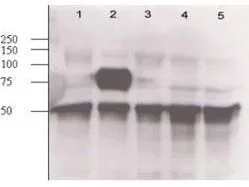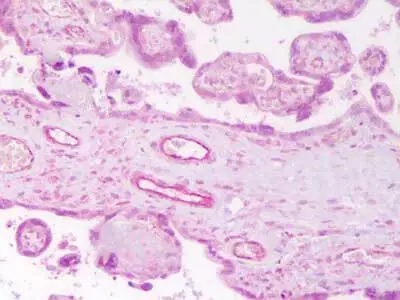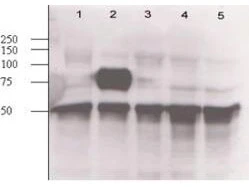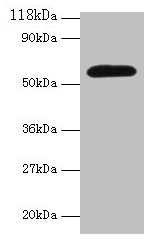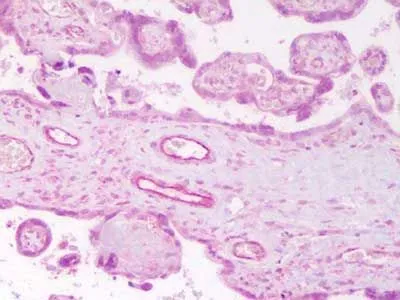
IHC-P of anti-ANG2 Antibody (GTX28452) in human placenta tissue. Antigen Retrieval: Heat, Citrate pH 6.2. Pressure Cooker Primary antibody: 2ug/ml for 1.5 hour RT.
Angiopoietin 2 antibody
GTX28452
ApplicationsImmunoPrecipitation, Western Blot, ImmunoHistoChemistry, ImmunoHistoChemistry Paraffin, Other Application
Product group Antibodies
ReactivityHuman, Mouse
TargetAngpt2
Overview
- SupplierGeneTex
- Product NameAngiopoietin 2 antibody
- Delivery Days Customer9
- Application Supplier NoteWB: 1:500-1:2000. IHC-P: 1:200-1:500. *Optimal dilutions/concentrations should be determined by the researcher.Not tested in other applications.
- ApplicationsImmunoPrecipitation, Western Blot, ImmunoHistoChemistry, ImmunoHistoChemistry Paraffin, Other Application
- CertificationResearch Use Only
- ClonalityPolyclonal
- Concentration80 mg/ml
- ConjugateUnconjugated
- Gene ID11601
- Target nameAngpt2
- Target descriptionangiopoietin 2
- Target synonymsAgpt2, Ang-2, Ang2, angiopoietin-2
- HostRabbit
- IsotypeIgG
- Protein IDO35608
- Protein NameAngiopoietin-2
- Scientific DescriptionAngiopoietin-1 (Ang-1) and Antiopoietin-2 (Ang2) are important for development of the endothelium, by regulating tyrosine phosphorylation of the membrane receptor Tie-2/Tek. Ang-1 binding to Tie-2/Tek causes phosphorylation of the receptor. Ang-2 competes for this binding, and thus blocks receptor phosphorylation. Ang-2 expression occurs at sites of vascular remodeling: dorsal aorta and major aortic branches, ovary, placenta and uterus. To our knowledge, this is the first time that an Ang antibody recognizes a band above 55 kD. This antibody (and the ang-1 antibody, GT28451) give a band at 75 kD which resembles the original size, because these are soluble highly glycosylated proteins, which should run higher that the calculated molecular weight of 55 kD.
- ReactivityHuman, Mouse
- Storage Instruction-20°C or -80°C,2°C to 8°C
- UNSPSC12352203
References
- Oehlers SH, Cronan MR, Beerman RW, et al. Infection-Induced Vascular Permeability Aids Mycobacterial Growth. J Infect Dis. 2017,215(5):813-817. doi: 10.1093/infdis/jiw355Read this paper

